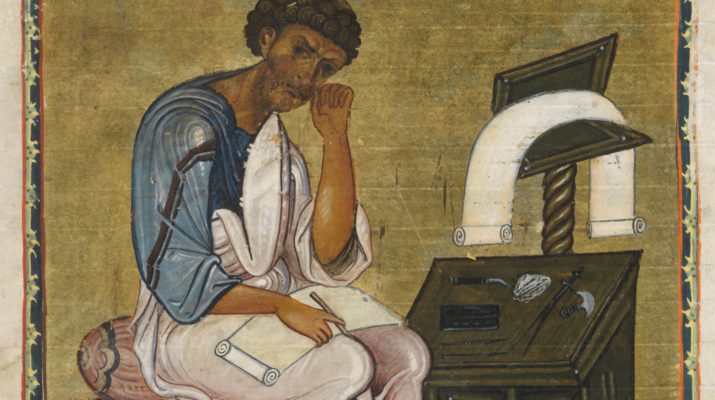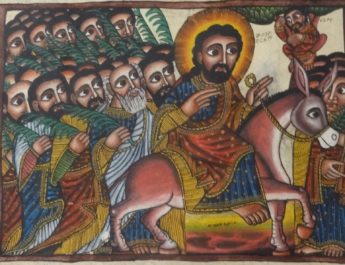1 Thessalonians 1:1-10
Proper 24A
1 Paul,I Silvanus,II and Timothy,III
I “Paul” = Paulos. From Latin Paulus (small, little). This is Paul or Paulos, meaning little.
II “Silvanus” = Silouanos. 4x in NT. Latin form of Silas (Silas; Saul); from Aramaic – cognate of Hebrew Shaul (Saul, meaning “asked of the Lord”); {from shaal (to ask, inquire)} OR {from Latin Silvanus (Silvanus, god of forests); {from silva (forest, grove); from Proto-Indo-European *sel- or *swell- (board, threshold)). This is Silvanus, meaning either “asked of the Lord” or “forest.” See https://en.wiktionary.org/wiki/Silvanus
III “Timothy” = Timoutheou. From time (worth or something’s perceived value; literally, price, but figuratively, the honor or value one sees in someone or something else; can be esteem or dignity; precious or valuables); {from tino (to pay, be punished, pay a penalty or fine because of a crime); from tio (to pay respect, value)} + Theos (God or a god). This is Timothy, literally “dear to God.”
To the churchIV of the ThessaloniansV in GodVI the FatherVII
IV “church” = ekklesia. From ek (from, out from) + kaleo (to call by name, invite, to name, bid, summon, call aloud) {related to keleuo (to command, order, direct); from kelomai (to urge on)}. This is properly a calling out or an assembly. It was used to refer to a church.
V “Thessalonians” = Thessaloniikeus. 4x in NT. From thessalonike (Thessalonica, Macedonian city); {perhaps from thessalos (Thessalian); {from thessalia (Thessaly); from thessalos (Thessalus)} + nike (victory, conquest; figurative for what makes one successful)}. This is Thessalonian. Philip II named his daughter Thessalonica when he conquered Thessaly. Later, her husband renamed the city after her. The exact meaning of Thessaly is not known. See https://en.wiktionary.org/wiki/%CE%98%CE%B5%CF%83%CF%83%CE%B1%CE%BB%CE%BF%CE%BD%CE%AF%CE%BA%CE%B7#Ancient_Greek
VI “God” = Theos. Related to “Timothy” in v1. See note III above.
VII “Father” = Pater. This is father in a literal or figurative sense. Could be elder, senior, ancestor, originator, or patriarch.
and the LordVIII JesusIX Christ:X
VIII “Lord” = Kurios. From kuros (authority, supremacy). This is a respectful address meaning master or sir. It refers to one who has control or power greater than one’s own. So, it was also applied to God and Jesus as Master or Lord.
IX “Jesus” = Iesous. From Hebrew Yehoshua (Joshua, the Lord is salvation); {from YHVH (proper name of the God of Israel; the self-existent and eternal one); {from havah (to become) or from hayah (to come to pass, become, be)} + yasha (to deliver, defend, help, preserve, rescue; properly, to be open, wide or free, which implies being safe. So, in a causative sense, this is to free someone)}. This is Jesus or Joshua in Greek – the Lord saves or the Lord is salvation.
X “Christ” = Christos. From chrio (consecrate by anointing with oil; often done for prophets, priests, or kings). Literally, the anointed one, Christ. The Greek word for Messiah.
GraceXI to you and peace.XII, XIII
XI “grace” = charis. From chairo (to rejoice, be glad; used to say hello; properly, delighting in the grace of God or experiencing God’s favor); from char– (to extend favor, lean towards, be inclined to be favorable towards). This is grace, kindness, favor, gratitude, thanks. It is the sense of being inclined to or favorable towards – leaning towards someone to share some good or benefit. This can be literal, figurative, or spiritual. It is grace as abstract concept, manner, or action.
XII “peace” = eirene. Perhaps from eiro (to join, tie together to form a whole). This is one, peace, quietness, rest, peace of mind, harmony. Peace was a common farewell among Jews (i.e. shalom) and this well-wishing included a blessing of health and wholeness for the individual. This word also indicates wholeness and well-being – when everything that is essential is joined together properly. This is peace literally or figuratively. By implication, it is prosperity (but not in the sense of excessive wealth. Prosperity would have meant having enough from day to day.)
XIII Some manuscripts add “from God our Father and Lord Jesus Christ” = apo + Theos + Pater + ego + kai + Kurios + Iesous + Christos. See above.
2 We alwaysXIV give thanksXV to God for allXVI of you
XIV “always” = pantote. From pas (all, every, each) + tote (then, whether past or future); {from hote (when); from ho (the)}. This is literally every when. It is always, at all times.
XV “give thanks” = eucharisteo. Related to “grace” in v1. From eu (good, well, well done, rightly) + charis (see note XI above). This is giving thanks, being thankful. It is a recognition that God’s grace is good and actively showing gratitude. It can also be used for saying grace before eating. This is where “eucharist” comes from.
XVI “all” = pas. Related to “always” in v2. See note XIV above.
and mentionXVII you in our prayers,XVIII constantlyXIX
XVII “mention” = mneia + poieo. Mneia is 7x in NT– all in epistles for remembering you in prayers and 1x to remember us kindly (1 Th 3:6). From mimnesko (to remind or remember; memory through an active, intentional process or being mindful; not incidentally or accidentally remembering); from mnaomai (to remember; by implication give reward or consequence); perhaps from meno (to stay, abide, wait, endure). Properly, this is bringing someone or something to mind or mentioning them. It can also be a memory or commemoration. Further, it can be a specific focus on an aspect of someone or something. Poieo is to make, do, act, construct, abide, or cause.
XVIII “prayers” = proseuche. From proseuchomai (to pray or pray for, to worship or supplicate; more literally exchanging one’s own wishes for God’s); {from pros (advantageous for, at, toward) + euchomai (to wish, make a request, pray)}. This is prayer, worship, or a place where one prays.
XIX “constantly” = adialeiptos. 4x in NT. From adialeptos (continual as not having unneeded gaps in the middle; constantly, unceasing, or incessant; can imply permanent); {from a (not, without) + dialeipo (to give up, cease, stop in the middle); {from dia (through, because of, across, thoroughly) + leipo (to leave behind, remain, lack, abandon, fall behind while racing)}}. This is constantly, unceasingly. It is something that continues without unnecessary interruption.
3 rememberingXX before our God and Father your workXXI of faithXXII
XX “remembering” = mnemoneuo. Related to “mention” in v2. From mnemon (mindful) OR from mneme (memory or mention); {from mnaomai (see note XVII above) or mimnesko (see note XVII above); or from meno (see note XVII above) or from massaomai (to chew, gnaw); from masso (to knead, squeeze)}. This is to remember, recollect. It does not necessarily imply remembering something that you forgot – it could be simply calling something to mind. It can mean to punish or rehearse.
XXI “work” = ergon. From ergo (to work, accomplish, do). This is work, task, deed, labor, effort.
XXII “faith” = pistis. From peitho (to have confidence, urge, be persuaded, agree, assure, believe, have confidence, trust). This is less about knowing, believing, and repeating a list of doctrines then it is about trusting God. Faith means listening to God and seeking to live a holy life even (and especially) when we don’t understand how everything works or fits together. Faith is about being faithful (trusting and doing) rather than being all knowing.
and laborXXIII of loveXXIV and steadfastnessXXV of hopeXXVI in our Lord Jesus Christ.
XXIII “labor” = kopos. 18x in NT. From kopto (to cut, strike, cut off; beating the chest to lament and so to mourn). This is trouble, toil, or labor. This is working to the point of exhaustion or weariness. At base, this refers to a blow that lands so swiftly that one is seriously weakened. Figuratively, this is being greatly tired or working to the point of being without strength.
XXIV “love” = agape. From agapao (to love, take pleasure in, esteem; to prefer). This is love, goodwill, benevolence. It is God’s divine love or human love that mirrors God’s love.
XXV “steadfastness” = hupomone. Related to “mention” in v2 & “remembering” in v3. From hupo (by, under, about) + meno (see note XVII above). This is properly to remain behind or remain under. It implies endurance, patience, steadfastness, and waiting in hope.
XXVI “hope” = elpis. From elpo (to anticipate, welcome, expect; usually to anticipate positively). This is expectation, hope, trust, confidence faith. The expectation can be abstract or concrete.
4 For we know,XXVII brothersXXVIII and sisters belovedXXIX by God, that he has chosenXXX you,
XXVII “know” = eido. This is to know, consider perceive, appreciate, behold, or remember. It means seeing with one’s eyes, but also figuratively, it means perceiving – seeing that becomes understanding. So, by implication, this means knowing or being aware.
XXVIII “brothers” = adelphos. From a (with, community, fellowship) + delphus (womb). This is a brother in a literal or figurative sense. It is also used of another member of the Church.
XXIX “beloved” = agapao. Related to “love” in v3. See note XXIV above.
XXX “chosen” = ekloge. 7x in NT. From eklego (to choose, select, elect); {from ek (from, from out of) + lego (to speak, tell, mention)}. This is properly a choosing out so it is a selection or choice. It is also used theologically to mean election i.e. God’s choice.
5 because our message of the gospelXXXI cameXXXII to you not in wordXXXIII onlyXXXIV
XXXI “message of the gospel” = euaggelion. Related to “give thanks” in v2. From eu (see note XV above) + aggelos (angel, messenger; a messenger from God bringing news – whether a prophet or an angel); {from aggellos (to bring tidings); probably from ago (to bring, lead, carry, guide)}. This is literally “the good news,” used for the gospel. This is also where “evangelism” comes from.
XXXII “came” = ginomai. This is to come into being, to happen, become, be born. It can be to emerge from one state or condition to another or is coming into being with the sense of movement or growth.
XXXIII “word” = logos. Related to “chosen” in v4. From lego (see note XXX above). This is word, statement, speech, analogy. It is a word that carries an idea or expresses a thought, a saying. It could refer to a person with a message or reasoning laid out in words. By implication, this could be a topic, line of reasoning, or a motive. It can be used for a divine utterance or as Word – Christ.
XXXIV “only” = monon. Related to “mention” in v2 & “remembering” and “steadfastness” in v3. From monos (alone, single, remaining, mere, desolate); from meno (see note XVII above). This is merely, only, simply, sole. It can also imply alone.
but also in powerXXXV and in the HolyXXXVI SpiritXXXVII
XXXV “power” = dunamis. From dunamai (to be able, have power or ability). This is might, strength, physical power, efficacy, energy, and miraculous power. It is force literally or figuratively – the power of a miracle or the miracle itself.
XXXVI “Holy” = Hagios. From hagnos (holy, sacred, pure ethically, ritually, or ceremonially; prepared for worship, chaste, unadulterated, pure to the core; undefiled by sin; figurative for innocent, modest, perfect). God is totally different from humanity and thus set apart. That which is consecrated to worship God (elements of worship) or to serve God (as the saints) are holy because they are now set apart for God’s purposes. Holy because important to God. This is sacred physically, pure. It can be morally blameless or ceremonially consecrated.
XXXVII “Spirit” = Pneuma. From pneo (to blow, breathe, breathe hard). This is wind, breath, or ghost. A breeze or a blast or air, a breath. Figuratively used for a spirit, the human soul or part of us that is rational. It is also used supernaturally for angels, demons, God, and the Holy Spirit. This is where pneumonia comes from.
and with fullXXXVIII conviction;XXXIX just as you know what kind of persons we proved to beXL among you for your sake.
XXXVIII “full” = polus. This is much, often, plenteous – a large number or a great extent.
XXXIX “conviction” = plerophoria. 4x in NT. From plerophoreo (to fulfills, fully convince, satisfy, accomplish, fully assure; to fully convince by using evidence or to make full); {from pleres (to be full, complete, abounding in, or occupied with); {from pletho (to fill, accomplish, supply; to fill to maximum capacity)} + phoreo (to bear constantly or habitually or repeatedly; it can mean to wear or carry a burden); {from phero (to bear, bring, lead, make known publicly; to carry in a literal or figurative sense)}}. This is full confidence, conviction. It is something that is fully borne out.
XL “proved to be” = ginomai. Same as “came” in v5. See note XXXII above.
6 And you becameXLI imitatorsXLII of us and of the Lord, for in spite of persecutionXLIII you receivedXLIV the word with joyXLV from the Holy Spirit,
XLI “became” = ginomai. Same as “came” in v5. See note XXXII above.
XLII “imitators” = mimetes. 6x in NT. From mimeomai (to emulate, follow, or imitate); from mimos (a mimic). This is a follower or imitator. It is imitation in a positive sense due to admiration of a good example. This is where “mime” and “mimetic” come from.
XLIII “persecution” = thlipsis + polus. Thlipsis is from thlibo (to press in on and make narrow, rub together, constrict; figuratively to oppress or afflict). This is pressure that hems us in – used often of internal pressure that makes us feel like we have no other options and are confined or restricted. So, this is persecution, affliction, trouble, distress, and anguish. There is a different word, stenoxoria, that refers to external pressure that we feel from what’s going on. Polus is the same as “full” in v5. See note XXXVIII above.
XLIV “received” = dechomai. This is to warmly receive, be ready for what is offered, take, accept, or welcome. It is to receive in a literal or figurative sense.
XLV “joy” = chara. Perhaps related to “grace” in v1 & “give thanks” in v2. From chairo (see note XI above). This is joy, delight, gladness. Can be understood as the feeling you get when you are aware of grace.
7 so that you became an exampleXLVI to all the believersXLVII in MacedoniaXLVIII and in Achaia.XLIX
XLVI “example” = tupos. 16x in NT. From tupto (to strike repeatedly, wound, punish; figuratively to offend). This is a figure, model, image, impression, pattern, copy. Properly, this is a model created through much repetition so figuratively it is the proper model. It can be the impression of a stamped image, the mark of a scar, the shape of a statue. Figuratively, it can refer to a style or resemblance. Used specially, it is a model as something to imitate or as a cautionary tale. This is where the word “type” comes from.
XLVII “believers” = pisteuo. Related to “faith” in v3. From pistis (see note XXII above). This is to believe, entrust, have faith it, affirm, have confidence in. This is less to do with a series of beliefs or doctrines that one believes and more to do with faithfulness, loyalty, and fidelity. It is trusting and then acting based on that trust.
XLVIII “Macedonia” = Makedonia. From makedonia (Macedonia, highland); from makednos (high or tall). This is Macedonia in Greece. See https://en.wiktionary.org/wiki/Macedonia
XLIX “Achaia” = Achaia. 10x in NT. Perhaps from achos (pain, distress, or grief). This is Achaia, perhaps meaning pain or trouble. Achaia was also a name used to refer to Demeter. See https://www.abarim-publications.com/Meaning/Achaia.html#.XsylTGhKhPY
8 For the word of the Lord has sounded forthL from you not only in Macedonia and Achaia but in everyLI placeLII your faith in God has become known,LIII
L “sounded forth” = execheo. 1x in NT. From ek (from, from out of) + echeo (to be noisy, roar like the sea, reverberate); {from echos (loud sound, roaring, or echo; a report, rumor, or fame); from eche (noise, sound)}. This is to make a sound or resound. It could emphasize the volume of the sound or its clarity. It could also mean to report broadly.
LI “every” = pas. Same as “all” in v2. See note XVI above.
LII “place” = topos. This is a place or region. It is a smaller space that can only hold a limited number of people whereas chora is a larger place. Figuratively it could be an opportunity.
LIII “become known” = exerchomai. From ek (from, from out of) + erchomai (to come, go). This is to go out, depart, escape, proceed from, spread news abroad.
so that we haveLIV no needLV to speakLVI about it.
LIV “have” = echo. This is to have, hold, possess.
LV “need” = chreia. From chraomai (to use, make use of, give what is needed, act in a specific way, request); related to chre (what is proper, fitting, or necessary). This is the is task, business, or affair. It can also be need, want, or destitution.
LVI “speak” = laleo. From lalos (talkative). This is to talk, say, or preach.
9 For they reportLVII about us what kind of welcomeLVIII we had among you and how you turnedLIX to God
LVII “report” = apaggello. Related to “message of the gospel” in v5. From apo (from, away from) + aggello (see note XXXI above). This is to report, declare, bring word. It is an announcement that emphasizes the source.
LVIII “welcome” = eisodos. 5x in NT. From eis (to, into, towards, among) + hodos (way, road, path, journey). This is an entrance or reception in a literal or figurative sense.
LIX “turned” = epistrepho. From epi (on, upon, among, what is fitting) + strepho (to turn, change, turn back, be converted; to turn around completely to take the opposite path or a completely different one); {from trope (turning, shifting, a revolution; figuratively, a variation); from trepo (to turn)}. This is to turn, return, or come again. It can also mean to revert. It is turning in a literal or figurative sense – also a moral turning.
from idolsLX to serveLXI a livingLXII and trueLXIII God
LX “idols” = eidolon. Related to “know” in v4. 11x in NT. From eidos (form, shape, sight, appearance); from eido (see note XXVII above). This is image, idol, worship or an idol.
LXI “serve” = douleuo. From doulos (a servant or for a slave, enslaved; someone who belongs to someone else, but could be voluntary to pay off debt or involuntary – captured in war and enslaved; a metaphor for serving Christ); perhaps from deo (to tie, bind, fasten, impel, compel; to declare something against the law or prohibited). This is to be a slave, serve, do service, obey, be devoted.
LXII “living” = zao. This is to live literally or figuratively. It is used for life including the vitality of humans, plants, and animals – it is life physical and spiritual and life everlasting.
LXIII “true” = alethinos. From alethes (true, unconcealed; true because it is in concert with fact and reality – attested; literally, what cannot be hidden; truth stands up to the test and scrutiny and is undeniable, authentic); {from a (not) + lanthano (concealed, hidden, unnoticed; to shut one’s eyes to, unwittingly, unawares)}. This is literally made of truth – that which is true or real, authentic. Something that is true from its source and has integrity.
10 and to wait forLXIV his SonLXV from heaven,LXVI whom he raisedLXVII
LXIV “wait for” = anameno. Related to “mention” in v2 & “remembering” and “steadfastness” in v3 & “only” in v5. 1x in NT. From ana (up, again, back, among, anew) + meno (see note XVII above). This is to await. It is earnestly waiting for someone who is anticipated. It can also mean to linger and to wait in hope.
LXV “Son” = huios. This is son, descendant – a son whether natural born or adopted. It can be used figuratively for other forms of kinship.
LXVI “heaven” = ouranos. May be related to oros (mountain, hill); probably related to airo (raise, take up, lift, remove). This is the air, the sky, the atmosphere, and heaven. It is the sky that is visible and the spiritual heaven where God dwells. Heaven implies happiness, power, and eternity.
LXVII “raised” = egeiro. This is to awake, raise up or lift up. It can be to get up from sitting or lying down, to get up from sleeping, to rise from a disease or from death. Figuratively, it can be rising from inactivity or from ruins.
from the deadLXVIII—Jesus, who rescuesLXIX us from the comingLXX wrath.LXXI
LXVIII “dead” = nekros. Perhaps from nekus (corpse). This is dead or lifeless, mortal, corpse. It can also be used figuratively for powerless or ineffective. It is where the word “necrotic” comes from.
LXIX “rescues” = rhuomai. 18x in NT– including from the Lord’s prayer “deliver us from evil”. Related to eruo (to draw or drag) OR related to rheo (to flow, overflow). This is to rescue or set free. It is to deliver from danger, to snatch up.
LXX “coming” = erchomai. Related to “become known” in v8. See note LIII above.
LXXI “wrath” = orge. From orgao (something that teems or stews; anger rising from prolonged personal contact that is fixed rather than an angry outburst; anger that stems from an individual’s sense of right and wrong, justice, etc.) or from orego (to stretch out towards, yearn for, aspire to, desire). This is impulse, wrath, anger, passion, punishment. Properly, this is fixed anger from ongoing personal irritation caused by something the one getting angry sees as unjust or evil. Wrath implies punishment. Can refer to human or divine wrath.
Image credit: “Evangelist portrait of St. Luke in a 10th century manuscript” from the Tetraevangelium, Constantinople.




